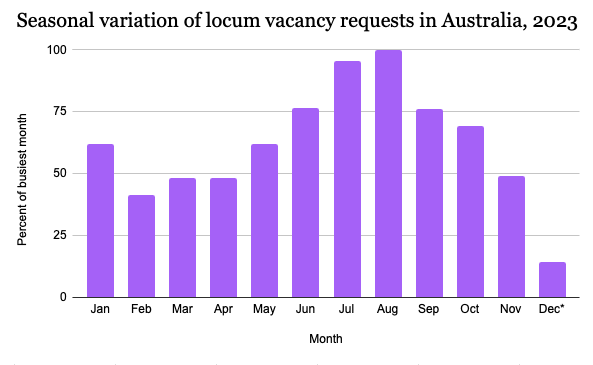When making locum career plans it's important to understand the seasonal variation of locum work in Australia.
Due to the rigid annual contract system in place for most junior and mid-level hospital staff across the country, there is significant volatility when it comes to the availability of certain roles at certain times of the year.
Generally speaking, the further you go up the medical career ladder, the less this applies to you, with consultants typically having steady demand year-round.
To illustrate the point further, here's a graph of hospital vacancy requests for the 2023 calendar year, derived from a proprietary dataset.
 Locum vacancy requests in Australia by calendar month, 2023. The graph reflects the date the vacancy request was sent, not the date the vacancy is for. For example, a vacancy request received in October might be for shifts that need covering in December
Locum vacancy requests in Australia by calendar month, 2023. The graph reflects the date the vacancy request was sent, not the date the vacancy is for. For example, a vacancy request received in October might be for shifts that need covering in December
Don't be fooled by the low vacancy requests in November and December. They are in fact the busiest periods, but because administrators go on leave like "normal" people over Christmas, they send far less vacancy requests over that time.
So, what can you do about this? Here are our tips:
Apply for all dates in the vacancy
The number 1 tip at the RMO level is to apply for all dates in the advertised vacancy, without exception. In quiet periods, RMO roles can get 30 or more applicants within the first hour of the vacancy being published. When hospitals are inundated, they look for any and all reason to cull candidates, and people who are not available for all dates are an easy target because they create more work for hospital administrations. You are of course free to apply for reduced dates if you choose, but you should know that if the market is quiet, your likelihood of getting the role will go down by 70% or more.
Be ready to go
Have all your documents ready to go ahead of time. It's quite tempting to want to delay this as long as possible, especially if you're with a new agency. But again considering the administrator's perspective, the less they have to follow-up on, the easier their life is. So if your agent can present your CV, references, working with children's check, iEMR certs and so on in one go, you become an easy choice.
Cast the net wider
Locums by definition do the work that other can't or won't do. If you really want to get booked, consider broadening your job search criteria. This might include night shifts, other geographies, other specialties, and so on. To be clear, We're not suggesting you practice outside your scope or take a job you're not clinically ready for. I'm specifically referring to taking jobs that are less desirable as one possible short-term solution.
Know your worth
During quiet times, temper your expectations when it comes to pay. A good rate for February is not the same as a good rate for October. Pay will easily fluctuate 50-100% over that time period. At the same time, you are a professional with highly valuable skills, so if the pay doesn't meet your expectations, you don't have to take the role, but know that may come at the expense of getting booked at all at a quieter time of year.
Look next door
Consider reaching out to local EDs directly for casual work. Bonus points if you have worked there before. This is particularly relevant for PGY-2s who are unfortunately another rung down the pecking order. This appears to be the best way for them to get start in something that resembles a locum year. (The NSW Health policy says that to be employable as a locum, you need to be PGY-3, although this is often not enforced in practice).
Call up old friends
The next tip won't help the complete newbies unfortunately. Apply at places you've already worked. Returning locums are almost always much less work than new locums, and so administrations often handpick them out of piles of unfamiliar CVs.
Plan your travel wisely
Many RMOs take a gap year because they want to facilitate travel and flexibility. When there is less work around, it makes sense to travel and live more. Of course I also understand that many people transitioning to the locum workforce want to work before they play, but this should be considered in the context of the rest of this post. "Gap yearing" from July to June seems to make the most sense if you want to locum before you travel.
Understand the market trends
It's also worth noting that certain hospitals understand these seasonal variations very well. In February they will attempt to book candidates for long terms at lower rates, as they are entitled to do. Realistically if you want to be working a full-term in the first quarter, the time to be seeking those opportunities is in October of the preceding year. So plan ahead with this in mind.
As with everything in this industry, it's a dynamic supply and demand marketplace. There will be ups and downs and conditions will change, and that uncertainty can be a source of stress, especially for a certain personality type. But understanding these dynamics can help minimise stress by allowing you to anticipate trends and plan accordingly.
Ready to take the plunge? Join Australia's fastest-growing community of doctors living and working flexibly.
